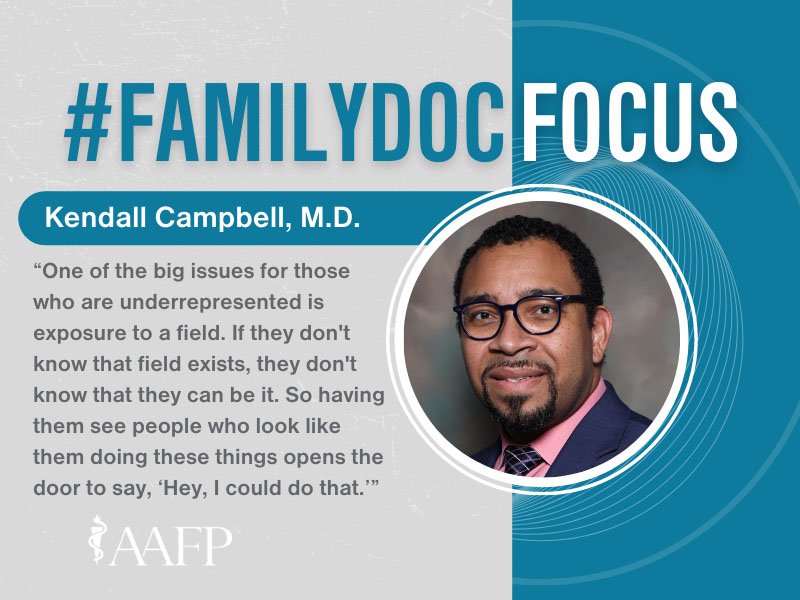FM Mentor Addresses Diversity, Equity With Data
November 18, 2021, 10:35 a.m. David Mitchell — Kendall Campbell, M.D., has been researching (and advocating for) health equity and diversity in the health care workforce for more than a decade, publishing dozens of articles related to diversity, inclusion and equity in peer-reviewed journals.

“When you can lead with data, you do a better job of bringing about change,” said Campbell, who was recently elected to the National Academy of Medicine.
Let’s lead with these data: The Brody School of Medicine doubled its admission of underrepresented minorities — from 16% of its student body to 33% — during Campbell’s time at the East Carolina University institution. Campbell, who served as an associate professor in Brody’s Department of Family Medicine from 2016-21 and also was director of the school’s Research Group for Underrepresented Minorities in Academic Medicine, said he expects that number to climb when the school reaps the benefits of Brody RISE, a pre-college program started under his leadership in 2018 that aims to enhance minority students’ access to medical education and increase the supply of primary care physicians in North Carolina.
“If you can get pre-college youth in a lab, you can expose them to things that otherwise they just won’t see, and it may spark their interest to become chemists, biologists, engineers and doctors,” said Campbell, who also served as associate dean for diversity and inclusion at Brody for three years before becoming senior associate dean for academic affairs and chief academic officer. “One of the big issues for those who are underrepresented is exposure to a field. If they don’t know that field exists, they don’t know that they can be it. So having them see people who look like them doing these things opens the door to say, ‘Hey, I could do that.’”
Campbell experienced the impact of such programs in his own youth. He attended an outreach program at Florida A&M University the summer after he graduated from high school, and his participation in that activity led him to the Science Students Together Reaching Instructional Diversity & Excellence program at Florida State University.
“That was the program that really pushed me over the top,” said Campbell, who spent four years with SSTRIDE, serving as a mentor in the program. “Programs like that are what really bring equity.”
Although pipeline programs play an important role in diversifying the health care workforce, Campbell questioned whether they accomplish enough.
“Academic medicine works hard at diversifying learners, but we struggle more with diversifying faculty,” he said. “So we increase the diversity of our student bodies without increasing the diversity of our faculty. That can create challenges between learners and faculty, especially when you have faculty who may be uncomfortable, or maybe just not know how to work with learners from different backgrounds and different cultures. So we’re beginning to look at the order in which you diversify an academic program. Where do you start?”
In recent years, Campbell has put an emphasis on mentoring faculty. He helped establish a yearlong STFM fellowship that offers training and mentorship for early-career, underrepresented minority faculty with a focus on developing scholarly writing skills for academic advancement and leadership. The program had seven fellows in its first year and has 12 this year.
“I think the biggest thing that you’re going to see from the work that we do is the nurturing of early-career underrepresented faculty and watching those faculty as they grow and progress through their careers all over the nation,” he said.
Campbell recently changed jobs, becoming chair of the Department of Family Medicine at the University of Texas Medical Branch in Galveston in October. He’ll continue to teach, see patients and, of course, do research in his new role.
“I’ve been doing academic medicine for my entire career and have really, really enjoyed the mix that brings,” he said. “I can’t do the same thing every day. I like the administrative work, research, mentoring, doing some presentations, meeting with learners. That mix is what really excites me and drives me.”